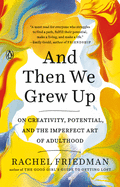
 There are plenty of books about people who follow their artistic dreams to glory. Rachel Friedman asks, "How about some books where we focus on gracefully giving up on something?" And Then We Grew Up: On Creativity, Potential, and the Imperfect Art of Adulthood is a fine specimen of the sort.
There are plenty of books about people who follow their artistic dreams to glory. Rachel Friedman asks, "How about some books where we focus on gracefully giving up on something?" And Then We Grew Up: On Creativity, Potential, and the Imperfect Art of Adulthood is a fine specimen of the sort.
The book evolved out of Friedman's disappointment that she hasn't reached a level of financial solvency in her chosen creative field; even after she became a published author--her first book was the travel memoir The Good Girl's Guide to Getting Lost--she had to take a part-time job as a managing editor to make ends meet. She wanted to know if her disillusionment is shared by others who, like her, fully intended to earn a living as an artist.
Friedman had a ready-made subject sample: her cohort of 20-odd years earlier at Interlochen, the fabled Michigan performing arts camp where she studied viola. In college, she felt as though she had hit a creative wall as a musician and stopped playing. She has wondered ever since if this was a mistake. Friedman tracked down some of her fellow campers to learn if they were still reaching for the stars and to what extent they had accepted compromise--and in And Then We Grew Up, "compromise" is usually a gentler way of saying "day job."
Friedman devotes a chapter to each of the eight now-adult Interlochenites whom she interviews. There's Daniel, an actor who transitioned to screenwriting and then took a job as a creative director at a Los Angeles special effects studio ("I really was sick of not seeing the things that I had written get made"). There's Jenna, a violin prodigy who is now a high school orchestra teacher ("Look, I've always been idealistic but realistic"). Friedman supplements their stories with elucidating findings from her dogged research into areas like the science of expertise and the weird way that creativity has been hijacked by capitalism ("Unleash the creative entrepreneur inside you!").
As it happens, someone profiled in And Then We Grew Up really, truly made it: when Friedman catches up with Michelle, she's a violist with the Oregon Symphony. And yet Michelle is thinking about switching careers: "I love playing, but I can see myself doing other things. I'm actually slowly trying to transition into arts management." If Friedman does a face-palm at the thought of how many people are in arts management because they failed their audition with the Oregon Symphony, she's too grown-up to say so. --Nell Beram, author and freelance writer
Shelf Talker: In this amiable look at the state of the artist, the author tracks down the people with whom she attended a performing arts camp 20 years earlier.

